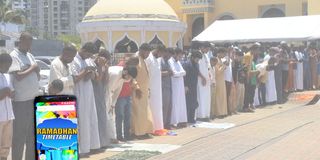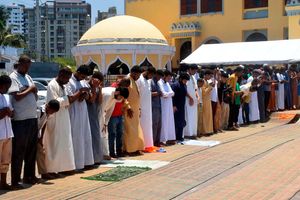
Traditionally, the call to prayer from mosques, printed schedules, and radio announcements guided the faithful. But many are now embracing technology.
As the crescent moon marked the start of the 2025 Ramadhan two weeks ago, millions of Muslims worldwide stepped into a month of fasting, prayer and reflection.
Traditionally, the call to prayer from mosques, printed schedules, and radio announcements guided the faithful.
However, many are now embracing technology besides the traditional means.
Smartphones buzz with prayer alerts, apps track fasting times and live-streamed sermons bring spiritual guidance straight to the palms of millions of Muslims.
From live-streamed Tarawih prayers (voluntary prayers after the obligatory evening prayer) to TikTok snippets of religious teachings, technology is bridging gaps and making spiritual guidance more accessible than ever before.
Sheikh Omar Buya from Mombasa witnessed this transformation first-hand.
As a religious leader, he sees how digital tools have made Islamic teachings more accessible to faithful.
“Technology has turned the world into a global village. Despite the distance people can be linked through the smartphone.
“To us preachers it has made it easier to spread the word during the season. I will just give my sermon and Muslims from across the world will access it effortlessly,” says Sheikh Buya.
He explains that young, tech-savvy media teams at his Mosque have taken the opportunity to broadcast sessions, while others use their personal devices to live stream or share key lessons on TikTok.
“We have a media team that sometimes records my sermons to Muslims, allowing them to follow along from wherever they are. This encourages wider engagement and accessibility,” says Sheikh Buya.
As technology continues to transform how Muslims observe Ramadhan, it’s not just social media and live-streamed sessions making an impact.
For many, fasting apps and smartphones have become essential, helping them to track when to start and break their fast, especially for those without printed schedules; to enhance worship; and to deepen religious knowledge.
From prayer reminders to Qur’an recitations, several apps make Ramadhan more organised and spiritually enriching.
Applications like Ramadhan Buddy, Muslim Pro, Deen-Quran, Athan Pro and Tasbih Counter help Muslims track prayer times, Qibla direction, fasting, Qur’an recitations, Islamic inspirations and key dates.
According to Ms Salma Athman, a teacher at Mshiu Primary School in Lunga Lunga Sub-county, Kwale County, technology has played a key role in strengthening the faith of Muslims during Ramadhan.
She explains that she formed a WhatsApp group that allowed her and other Muslims across the country to congregate and encourage each other during Ramadhan.
Such technology, including live video calls, also come in handy to families whose kin reside abroad for them to stay in touch visually during the Holy Month.
“We formed a WhatsApp group that has been very instrumental during Ramadhan. For example through this group we are able to wake each other up early in the morning for prayers.
“Many people rush to their phones when they wake up and now when they wake up and find a missed WhatsApp call they know it was meant for morning prayer,” said Ms Athman.
She adds that the group offers reminders for different prayers throughout the day, while sharing videos and messages that help them remain faithful during the Holy Month of Ramadhan.
“I have attended meetings where great speakers in our faith share their teachings, and I record the videos to share with our members. Some attest that being part of the group helps them stay in sync with other Muslims.
“TikTok and YouTube have also played a significant role in spreading faith-related teachings during the month,” says Ms Athman.
She adds that the digital Electronic Tasbih Counters, which replaced the traditional beads, have allowed Muslims to keep track of their recitations during Ramadhan, with a simple press of a button.
Mr Bujra Mohammed from Mwabungo area in Kwale County, a content creator with a large social media following, says that social media has played a significant role in helping him reach out to the less fortunate during Ramadhan.
He says that fasting reminds Muslims of the importance of giving, as experiencing hunger first-hand fosters empathy for those who live without food regularly.
“Social media has a significant impact during Ramadhan. With my global following, I have launched campaigns to raise funds for the less fortunate to have food for Iftar and to support mosques in poor condition.
“Through social media, the call to give is amplified, allowing people from around the world to contribute and ensure that Muslims here have something to eat,” says Mr Mohammed.
Without technology, the fundraising drives would not have been as impactful, as they now receive donations from overseas, he said.






